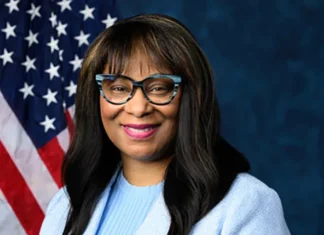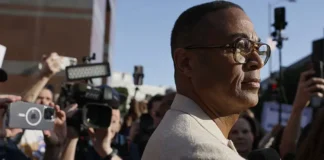
With just days to go until Nov, 5, we have officially entered the final stretch of the election. The heat is on, the candidates are feeling the pinch, and the rhetoric we see on our TVs and in our feeds is starting to go off the rails.
Case in point: I watched a CNN discussion about the Black male vote and Kamala Harris that illustrates the faulty and dangerous narrative at the core of Trump’s attempt to sway Black men.
At the risk of sounding unhinged myself, I’m going to quote one of the guests on the show, right-wing radio host Shelley Wynter’s assessment of the Black male vote: “This race is between House African Americans and field African Americans, and the field African Americans are going for Donald Trump. … I’m talking about your men who build, your men who put things together, your men who work with their hands, your men who do things. … They’re plumbers, they’re electricians … these men, these men are going for Trump.”
Leaving aside his odd and ahistorical slavery allusion, Wynter is laying out what they think is the most convincing argument to appeal to Black male voters: “Voting for a woman makes you weak.”
Let me be really clear: Black men are not children. We are not little boys who have to be praised as “manly men” before we cast a vote.
Our fathers, uncles, and grandfathers did not need such empty platitudes when they suited up and died for a country that openly denigrated them by law. They did not need C-list celebrity endorsements as they risked life and limb to cast their ballots in a country reluctant to even offer them the opportunity. And they definitely did not need people outside of the community to repeatedly denigrate, deride, and denounce Black women so that Black men could feel better.
We do not need our egos stroked, gold sneakers, or mug shot T-shirts.
We have far more to gain from a Harris administration than a Trump rerun.
Like all other voters, Black men want to make sure that our needs as people and our rights as citizens are heard and respected, not to pretend that we cannot see with our own eyes what Trump has done.
So, let’s set the record straight: To her credit, Kamala Harris has not relied on her own racial identity, her time at Howard University, or her membership in Alpha Kappa Alpha to show Black people they are a priority. In addition to speaking with “Breakfast Club” host Charlamagne tha God and other outlets targeting Black men, Harris has unveiled her “Opportunity Agenda,” which focuses on spurring entrepreneurship through forgivable business loans, apprenticeships, and the opportunity to succeed in the cannabis industry instead of being targeted and locked away for it.
And even before she became this year’s nominee, Harris and the Biden administration showed her vision for Black men and Black people by making sure that the Emmett Till Antilynching Act passed, Black farmers were supported with $2 billion, Black businesses grew by 14%, HBCUs thrived with $17 billion in funding and our brothers were pardoned for marijuana charges.
Trump and his acolytes want to do away with unions and cozy up to other billionaires.
And let me be really clear: as a Black man in the labor movement — a movement filled with Black men who work with their hands who are plumbers, electricians, and more — we have far more to gain from a Harris administration than a Trump rerun.
In the last four years, Black men have thrived in the labor movement. Not only did Black workers see some of the fastest wage growth in that period, but Black folks in unions also saw racial disparities decline faster than those without unions. Unions reduce the historic wage and wealth gap between Black and white workers—with Black workers seeing a 14% wage boost from collective bargaining. Black union workers’ wages are more than 34% higher than the wages of their nonunion peers; Black union workers are nearly 25% more likely to have employer-provided healthcare and almost twice as likely to have employer-provided retirement plans.
Trump and his acolytes want to do away with unions and cozy up to other billionaires like Elon Musk, who cheered on the idea of firing workers who strike for better conditions.
Trump is a man who gassed Black men and women when they marched for racial justice; he lied about Haitian immigrants; he said police brutality was OK when he called for one “violent day” in which police could fix crime; and when he saw he was losing the last election, he focused on invalidating Black votes from swing states like Georgia and Michigan.
He thinks we will excuse his lying about our people because he shook hands with Lil Wayne. He’s betting that he can persuade you to see Kamala Harris the way he sees her: a threat to his twisted sense of masculinity.
Trump is wrong.
When we look at Harris, we see someone we recognize — a Black woman who worked against all the odds to become a state attorney general, a senator, and vice president of the United States.
I’m calling on all Black men in labor to stand up in solidarity with Kamala.
We see the sister we knew who was always in her books but found time to have fun, a sister who never forgot who she was because she never forgot where she came from. And we see a sister who has always looked out for her brothers.
Trump wants us to forget what Black women mean to us, have always meant to us. They are our partners, friends, and often the glue of our community. In 2013, when Trayvon Martin’s murderer went free, it was Black women who started the Black Lives Matter movement to bring attention to our abused and ignored bodies. When Barack Obama ran for the presidency, it was Black women’s support (over 90%) that helped him make history.
When we needed them, Black women supported us. And now a Black woman is asking for our support.
So, I’m calling on all Black men in labor to stand up in solidarity with Kamala and the vision she has laid out for Black men, the Black community, and the entire country. We have seen what Trump has done; we have seen what this country can do to Black leaders, and we are not going back.

Fedrick C. Ingram is the Secretary-Treasurer of the American Federation of Teachers, serving 1.8 million members, including pre-K through 12th-grade teachers; school and college support staff; higher education faculty; federal, state, and local government employees; and nurses and other healthcare professionals. Ingram is the immediate past president of the 140,000-member Florida Education Association. He also has served as an elected vice president of the AFT’s executive council.















